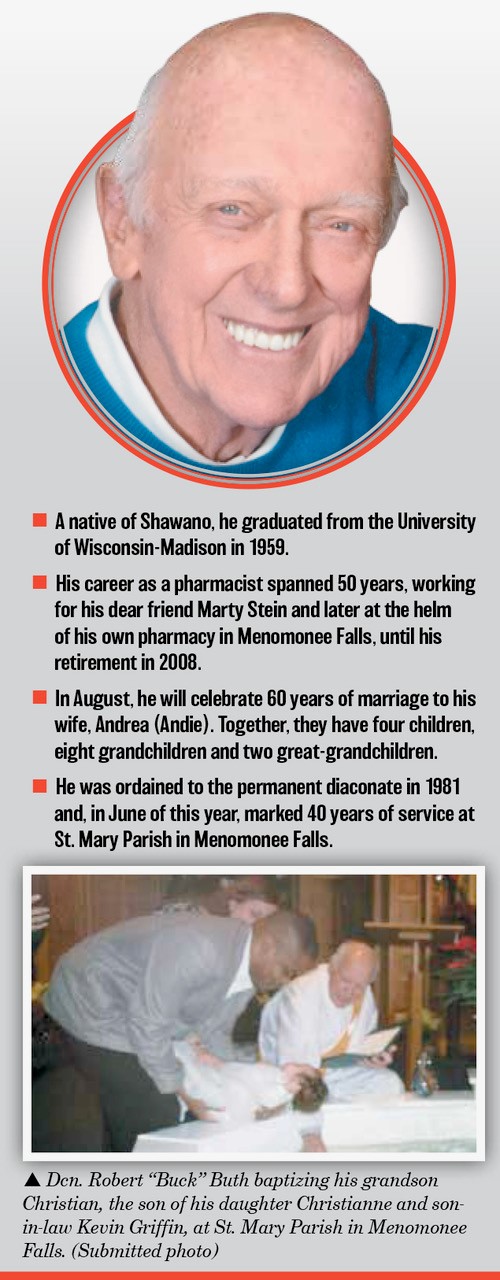Give Us Shepherds
Was your Catholic faith a big part of your childhood?
As a little kid, I would sometimes put on one of my mother’s housecoats and pretend to say Mass. We had this fish food that was flat (like a host), and I would cut out little wafers and say Mass. Our neighborhood was almost all Lutheran, but the mothers didn’t mind it because the kids learned the Lord’s Prayer.
What made you want to become a pharmacist?
I had never stood behind the counter of a drug store before the summer before my last year at UW-Madison. I didn’t really know what I was getting into but my wife and I both have an attitude where, when you make decisions, you make the most of it. You don’t look back, you don’t complain, you just enjoy everything as it comes along.
How did you and Andie meet?
I actually met her on a blind date while I was visiting my brother at University of Wisconsin-Oshkosh, where they both were students, after I graduated college. At that time I believed in life, liberty and the happiness of pursuit. I was not looking for a wife. I met her and my mother said, “You know, you’re getting pretty serious with this girl,” and I said, “I’m scaring myself — I think this is the woman I’m going to marry.” She had everything I was looking for. All of a sudden I thought, “If I don’t marry her, I may not find another like her.”
How did you end up here in the greater Milwaukee area?
I was going to buy a drug store up in Shawano, but the night before the closing the owner called me and said he’d been offered more money. I didn’t want to match it. It was just a day after that I got a phone call from a classmate who was working for another classmate of mine, Marty Stein. He said, “You ought to really come down and work for Marty.” Andie burst into tears when we shook on it — she was from Menomonee Falls, and she never thought she would be able to come home.
Tell us about your friendship with Marty Stein and what you learned from him.
He was a rare guy. I managed Marty’s store — the stores in those days were all just little shops but his store in Menomonee Falls was like the big drug stores now. I was there until he sold it to Walgreens for $28 million, and he spent the rest of his life raising money for needy causes. With him, one of the things that was amazing was that he worked on so many charities — he would be meeting with the bishop at least every month or so because he was working with so many different charities. He was Jewish, but he probably had a Catholic priest praying for him every day because he supported so many causes that had to do with the Church. When he found out he had terminal cancer, the top oncologist in the country told him he had only six months to live, but he lived 10 years, so the prayers must have been working.
After working for Marty, you owned your own pharmacy for 10 years, while you were a deacon. How did those two parts of your life intersect?
We always had a picture right by the register of Jesus kneeling down with about five or six little children around him, all of them with big smiles on their faces. So, the customers all knew where I was coming from. I wore a crucifix around my neck on a chain. I loved it because if somebody came in and they found out they had cancer or something, I could have four or five people standing there and I could cry with them, pray with them, things like that, and nobody would leave — that’s something I never would have been able to do in one of the big stores.
What is a great memory from your travels?
I had the privilege of being a Eucharistic minister at Archbishop (Timothy) Dolan’s pallium Mass in St. Peter’s in Rome with Deacons Bill Banach, Dean Collins and Larry La Fond. We spent a week in a hotel together with no air conditioning. But I got the opportunity to be on the altar with what were later three cardinals — Archbishop Dolan, Archbishop Regali, and Cardinal Foley — at a Mass presided over by a saint — John Paul II.

